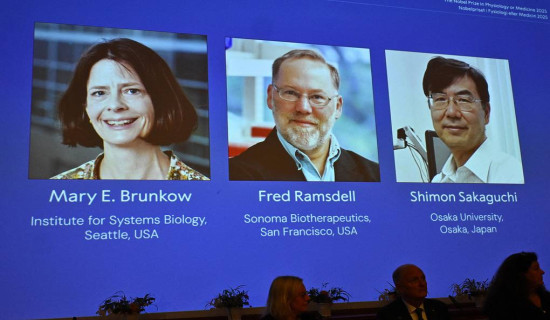- Tuesday, 7 October 2025
The Sound Nobody Talks About: Tinnitus
Garima Thapa 
Imagine hearing a ringing, buzzing, or hissing sound that no one else can hear and knowing it may never stop. For millions of people, this is not a passing irritation but a constant companion: the lived experience of tinnitus.
Tinnitus is often brushed off as a minor issue, but for those who live with it, it’s far from insignificant. It’s a persistent internal sound that can make silence unbearable and concentration difficult. Despite affecting an estimated 10 to 15 percent of the global population, it remains one of the least acknowledged and least understood health concerns today.
Tinnitus can be triggered by a variety of factors. The most common cause is prolonged exposure to loud noise, which damages delicate hair cells in the inner ear. Ear infections, earwax buildup, age-related hearing loss, as well as certain substances are additional factors. Tinnitus can sometimes be caused by Ménière's disease or head and neck injuries. However, the exact cause often remains unclear making diagnosis and therapy more challenging.
Its effects extend far beyond the ears. Tinnitus can disrupt sleep, interfere with memory and focus, and trigger ongoing anxiety or emotional exhaustion. For some, it becomes a major contributor to depression or social withdrawal. What makes it worse is how often these experiences are minimized both socially and medically. Many people are told to “ignore it” or “learn to live with it”, as though their suffering is somehow not real enough to guarantee attention.
Emerging research now suggests tinnitus is more than just an ear issue, it’s also a brain disorder. Scientists have found links to central sensitization and neuroinflammation, where the brain becomes overly reactive to sensory signals. Some researchers even connect tinnitus to atypical migraines, indicating that it may involve the same kinds of brain hyperactivity. This opens up new treatment options, such as cognitive behavioral therapy (CBT), migraine medications, and a technique called bimodal stimulation which combines tongue and sound stimulation and has shown promising results.
Researchers now think that tinnitus affects more than just the ears; it also affects how the brain processes sound. The brain can get overactive and produce sounds that aren't actually present when it doesn't receive clear information from the ear. New treatments are being tested to help calm this brain activity and provide relief to patients suffering with tinnitus.
The fact that there is no cure at the present is extremely disappointing. There are several therapies available, including sound therapy, mindfulness-based approaches, and hearing aids, but they are often unsuccessful, difficult to get, or not covered by insurance. There just isn't a clear path to recovery for many. Furthermore, tinnitus is often disregarded since it does not properly fall into one category, it is neither a mental nor a physical illness.
This silence around tinnitus is part of the problem. In a world where mental health and sensory disorders are finally gaining overdue attention, tinnitus remains in the shadows. It's rarely mentioned in health education, almost never screened for, and barely researched compared to its impact. That’s not just a missed opportunity, it’s a failure of public health priorities.
Raising awareness is not just about sympathy. It’s about giving people language for what they’re going through, encouraging early intervention, and advocating for better research and policy. Tinnitus-related suffering will only worsen unless we prioritize prevention, such as safer noise settings and accessible protection in high-risk occupations.
We may not see tinnitus, but we can choose to hear those affected by it. Awareness is the first step toward meaningful change.
(Author Thapa is a third-year Bachelor student of Literature and Psychology at St. Xavier’s College in Kathmandu)







-square-thumb.jpg)







